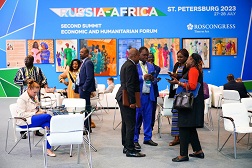As the Russia-Africa summit unfolds in St. Petersburg this week, discussions are actively addressing critical global issues, such as food security and climate change, which can only be solved through a collaborative effort by many countries.
Russian petrochemical company SIBUR presented its climate strategy at the Russia-Africa summit and emphasized the need for a cross-border carbon trading mechanism to achieve the global goal of reducing CO2 emissions.
SIBUR places sustainable development high on its agenda. The company produces PET granules for plastic bottles using post-consumer recycled plastics, installs renewable energy capacities at its factories, and uses environmentally friendly equipment. These efforts, along with SIBUR’s international verification of its climate projects, allowed the company to earn carbon offset credits in Russia.
Russia established the National Register of Carbon Units last year, enabling SIBUR to sell its carbon offsets domestically, creating an incentive for other companies to decarbonize their production processes. SIBUR strongly supports the idea of creating an international carbon trading market, which was discussed at COP-27 in Egypt and during the BRICS summits. SIBUR also supports the idea of mutual recognition of carbon unit registers in different countries and regions, which would facilitate the cross-border trading of emissions.
According to Elena Myakotnikova, Head of Climate Initiatives and Carbon Regulations at SIBUR, only a coordinated effort by many countries can help humankind reduce CO2 emissions and combat global warming. SIBUR has also planted 2 million trees in Russia as the company considers nature-based solutions to be another important tool for the compensation of CO2 emissions. The company hopes that the international community will follow its example in employing such approaches.
Doubling Export
In a related development, SIBUR, Russia’s largest petrochemical producer, revealed its plans to double polymer sales to Africa this year in response to the growing demand, as stated by the company representative during the Russia-Africa summit in St. Petersburg.
The rapid economic development in Africa had led to increased consumption of polymers, particularly in North African countries, Nigeria, and the South African Republic. These polymers, including polypropylene and polyethylene, find diverse applications, such as car molding, medical instruments, and plastic packaging, which plays a crucial role in extending the shelf life of food and ensuring global food security.
Since early 2022, SIBUR has been redirecting its export sales from Europe to emerging markets, including Africa. The company processes residuals of oil and gas production into value-added polymers while also implementing a long-term program to reduce its carbon footprint.

